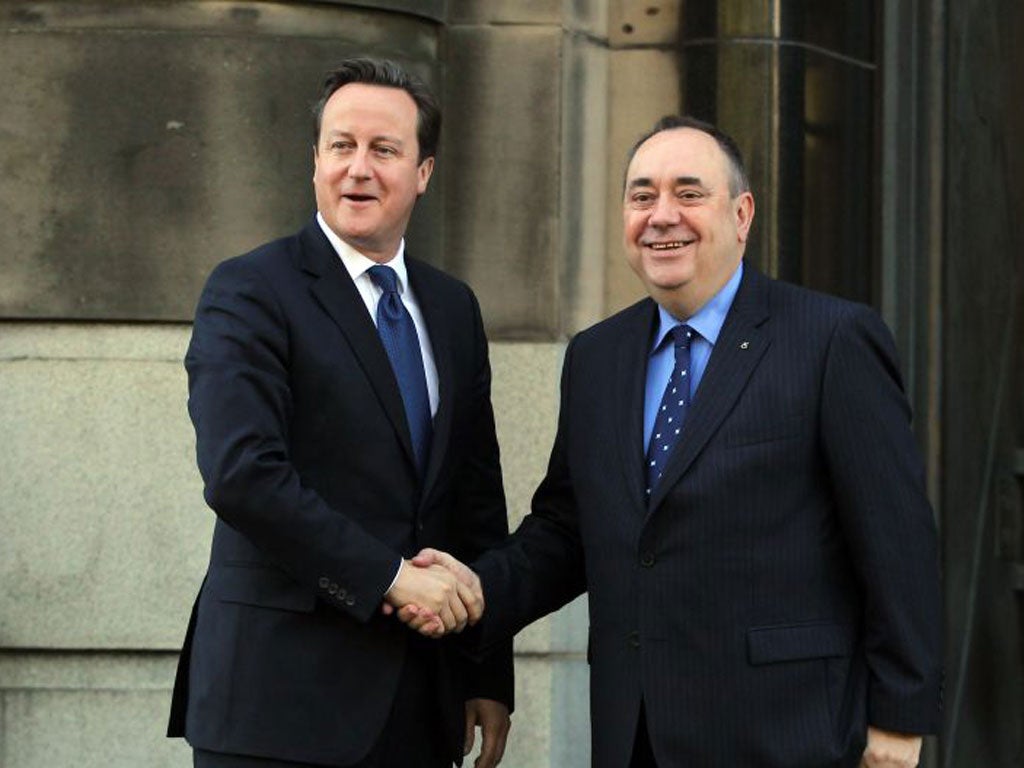Gloves are off after David Cameron and Alex Salmond start the clock on Scottish independence referendum
The Scottish and UK governments signed an historic agreement on an independence referendum today

A two-year campaign to win the hearts and minds of the Scottish people before they vote on whether to leave the United Kingdom began today after the Scottish and UK governments signed an historic agreement on an independence referendum.
David Cameron, who approved the deal in Edinburgh with Alex Salmond, the SNP First Minister, immediately dangled the prospect of further devolution if the country votes No to breaking its 305-year link with England since the 1707 Act of Union. The Prime Minister made a clear attempt to stop the SNP pushing supporters of more devolution into the Yes camp after Mr Salmond dropped his idea of having such a “devo max” option on the ballot paper.
The Coalition Government insisted on a single question. In return, Mr Salmond achieved his goals of delaying the referendum until 2014 and for 16 and 17 year-olds to be allowed to vote.
Mr Cameron said: “All those who want to see not only the status quo but further devolution from the United Kingdom to Scotland must vote to stay within the United Kingdom. Then it'll be for all the parties to decide what proposals to put forward, but I've always taken the view we have to answer this prior question first. We have to answer the question: does Scotland want to stay in the United Kingdom? If the answer is Yes we do want to stay in the United Kingdom, then obviously further devolution is possible.”
Denying that the UK Government had made more concessions in the negotiations than the SNP administration in Edinburgh, Mr Cameron said: “What we have is what I always wanted, which is one single question, not two questions, not devo max, a very simple single question that has to be put before the end of 2014 so we end the uncertainty, we put beyond doubt Scotland's position either within the UK, as I hope, or separating itself from the UK.”
Mr Salmond insisted the Yes campaign could turn round opinion polls putting the No camp ahead by “winning the argument” over the next two years. “I believe we'll win it by setting out a positive vision for a better future for our country economically and also, crucially, socially,” he said.
The First Minister said today’s agreement paved the way for the most important decision Scotland has made in several hundred years. “It is, in that sense, an historic day for Scotland and a major step forward in Scotland's home rule journey.” He said the deal meant there would be “respect” for the outcome “whatever it is” and meant the SNP could now address the substantive arguments involved in devolution.
The pro-independence campaign faces an uphill struggle because polls in recent months showed an average 37 per cent of Scots in favour of a breakaway after “don’t knows” are excluded. John Curtice, professor of politics at Strathclyde University, said Mr Salmond needed to convince Scots they would enjoy “sunnier economic times” as a separate country. “Even amongst the three in 10 Scots who say they are ‘Scottish, not British’ only just over half (53 per cent) currently say that they want independence,” he added. “Some 78 per cent of those who think the Scottish economy would be a lot better under independence are in favour of leaving the UK. However, at the moment almost as many people think Scotland’s economy would be worse under independence as believe it would be better.”
Downing Street insisted that allowing 16 and 17-year-olds to vote in the Scottish referendum did not open the door for the same group to take part in future general elections – or even in the referendum on Britain’s relationship with the European Union floated by Mr Cameron.
A Number 10 spokesman said: “The Government certainly has no plans to change the voting age. The agreement being signed today is specific to the referendum. We are confident that there are no wider implications or precedents for elections, or indeed referendums, under UK electoral law.”
Join our commenting forum
Join thought-provoking conversations, follow other Independent readers and see their replies
Comments
Bookmark popover
Removed from bookmarks